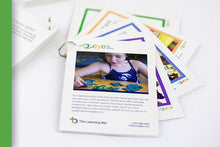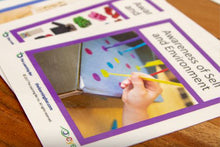Family Activity Cards
- Regular price
- $16.95
- Sale price
- $16.95
- Regular price
-
- Unit price
- /per
Adding product to your cart
Looking for new activities to do with your child? Trying to find something developmentally appropriate? Try our Family Activity Cards. The cards are designed by early years professionals for families who are looking for fun and engaging things to do with their child at home. The cards focus on the five domains of early learning that are closely associated with readiness for school: awareness of self and environment, social skills and approaches to learning, cognitive skills, language and communication, and physical development.
These play-based activities are appropriate for pre-school and kindergarten-aged children.
The cards are easy to understand and engaging. The front of the card has a picture that shows the activity while the back of the card provides a description of the domain, the goal of the activity and how to play. Each developmental domain outlined below has a selection of activities designed to strengthen a child's skill within that specific domain.
Awareness of self and the environment is the lens through which all future information is filtered. It influences what children will notice and think about, and how they will organize new information gleaned from future learning experiences.
Social skills and approaches to learning influence the successful transition to school, and to later social and academic success. Research demonstrates that children whointeract well with teachers and peers form good social relationships, are perceived more positively, and do better academically.
Cognitive skills refers to pre-academic skills or 'readiness to learn at school'. These include foundational literacy skills and numeracy skills (i.e., naming letters and counting). Children who enter school with well-developed readiness skills make a more successful transition to school and achieve better academically. Early literacy research shows that kindergarten children’s ‘inside-out’ skills are strong predictors of their ability to read in Grades 1 and 2. Inside-out skills refer to children’s knowledge of features inside the printed word such as the ability to name alphabet letters or identify beginning consonant sounds.
Language and communication refers to ability to listen and understand instructions, speak and communicate and understand stories and events. Children with strong language and communication skills language are better able to understand the language of school, to follow classroom instructions and discussions, and to learn to read. Children with a good sense of story have basic narrative concepts and an understanding of story structure. Research shows that this knowledge helps them to derive meaning from print and to understand what they read. Children who communicate well find it easier to participate in classroom discussions and activities, and to form relationships with teachers and classmates.
Physical development includes both fine motor and gross motor skills. Children’s motor skills, coordination, energy level, and physical health affect their ability to successfully participate in a wide range of school experiences that foster early learning. These experiences transcend domains. They may be social (playing games at recess), or academic (having adequate fine motor skills to print, draw, and cut with scissors).
24 durable, laminated cards.
Cards are attached with a metal ring for easy removal.
Measures 11 cm by 14 cm (4.3’’ by 5.5’’)
Place cards around the home as reminders of fun activities to do day-to-day!




